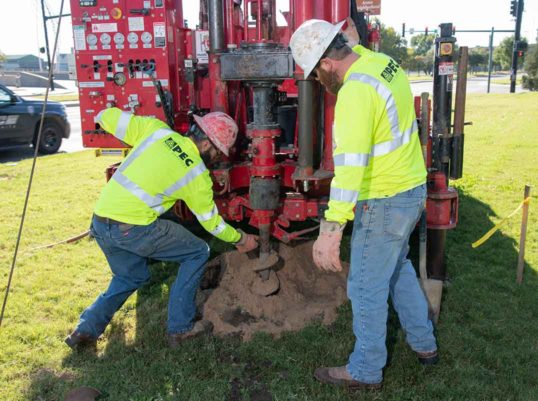Geotheta: A Comprehensive Overview to Its Role in Geotechnical Analyses
Geotheta: A Comprehensive Overview to Its Role in Geotechnical Analyses
Blog Article
Unveiling the Essential Geotechnical Services: Just How Geophysical Survey, Slope Security Analysis, and Groundwater Keeping An Eye On Enhance Infrastructure Advancement
In the world of facilities growth, the significance of geotechnical services can not be overemphasized. Geophysical survey, slope security evaluation, and groundwater monitoring stand as columns that strengthen the foundation of massive tasks. These services offer very useful insights into the subsurface problems, possible threats, and overall expediency of building and construction endeavors. By utilizing the power of sophisticated modern technologies and expert analysis, facilities designers can browse intricate obstacles with foresight and precision (geotheta). As we unwind the detailed internet of geotechnical services, a deeper understanding emerges of exactly how these basic parts harmonize to not only alleviate threats yet additionally maximize the efficiency and longevity of infrastructure projects.
Relevance of Geophysical Study
Carrying out a geophysical survey is vital in facilities development as it provides crucial understandings right into the subsurface conditions and potential geological threats. By making use of different geophysical methods such as ground-penetrating radar, seismic studies, and electro-magnetic induction, rock hounds and designers can map out the below ground frameworks and identify potential threats before construction starts. This positive method aids in preventing costly shocks during the building phase, ultimately conserving money and time.
Geophysical studies are especially important in analyzing the security of the ground, locating below ground utilities, and recognizing potential ecological issues. Recognizing the soil make-up, depth of bedrock, and aquifer levels is vital for creating solid foundations and water drainage systems that can endure all-natural forces and protect against soil disintegration.
Moreover, geophysical surveys play a significant function in making certain the security and long life of infrastructure jobs by giving vital details for site choice, course planning, and danger reduction strategies. In general, the relevance of geophysical surveys in facilities advancement can not be overemphasized, as they form the foundation for lasting and successful building jobs.
Enhancing Incline Security Evaluation
Enhancing slope stability analysis is an essential aspect of geotechnical engineering in making sure the safety and security and strength of infrastructure projects. By utilizing sophisticated modern technologies and techniques, geotechnical designers can assess the stability of slopes much more precisely and thoroughly. One trick approach for boosting incline security evaluation is the application of mathematical modeling software program, which permits designers to imitate numerous incline problems and possible failing systems. These versions give valuable insights into the factors affecting incline security, such as dirt properties, groundwater degrees, and exterior lots.
Furthermore, carrying out thorough field investigations, consisting of geological surveys and geophysical testing, can boost the precision of slope security evaluation. Overall, improving incline security analysis is vital for ensuring the long-term security and sustainability of framework projects.
Role of Groundwater Tracking
Reliable groundwater surveillance plays an important function in making certain the security and safety of facilities jobs. Groundwater degrees can significantly impact the structural stability of structures, passages, and various other below go ground frameworks. By continually monitoring groundwater levels and quality, engineers can determine prospective dangers such as soil erosion, foundation instability, and waterlogging.
Groundwater tracking assists in examining the influence of building and construction tasks on neighborhood aquifers and water sources. It enables the very early discovery of any type of groundwater contamination, stopping ecological dangers and making sure compliance with regulations. Moreover, by understanding the groundwater characteristics, designers can carry about his out proper dewatering procedures to manage water inflow during excavation and building and construction procedures, minimizing the danger of flooding and structural failing.
Integrating Geotechnical Provider
Groundwater monitoring, a critical aspect of facilities development, lays the groundwork for integrating geotechnical solutions perfectly into construction jobs. By comprehending the behavior of groundwater within the task site, designers can make educated decisions pertaining to foundation layout, slope security, and general project expediency. Integrating geotechnical solutions involves integrating various methods such as geophysical surveys, slope security analysis, and groundwater surveillance to offer a thorough understanding of the site problems. This integration improves the overall job style, preparation, and construction phases, causing more cost-effective and effective framework development.
Moreover, the combination of geotechnical services enables the identification of potential threats and obstacles early in the task lifecycle, making it possible for positive procedures to be carried out to alleviate these problems. Through a multidisciplinary approach that includes geophysical, geological, and hydrological information, engineers can optimize construction procedures, lessen environmental impact, and ensure the lasting security read the article and performance of the framework. On the whole, incorporating geotechnical services is essential for effective and sustainable infrastructure growth.

Advantages for Infrastructure Advancement
In the realm of framework development, the use of incorporated geotechnical services brings forth a wide variety of benefits that considerably improve project results. Incline security analysis plays an important duty in ensuring the security and long life of framework by evaluating the stability of inclines and advising necessary reinforcement procedures. On the whole, the incorporation of geotechnical services in infrastructure advancement not just boosts task performance but also contributes to the longevity and durability of constructed facilities.
Conclusion

Enhancing incline security analysis is a critical element of geotechnical design in guaranteeing the safety and security and durability of framework projects. Generally, enhancing slope security analysis is vital for ensuring the long-lasting safety and security and sustainability of infrastructure jobs.
Incline stability evaluation plays a critical function in making sure the safety and longevity of facilities by analyzing the stability of slopes and suggesting essential reinforcement steps. geotheta.In verdict, geophysical study, slope stability analysis, and groundwater tracking are critical geotechnical services that play an important function in boosting framework development. The benefits of integrating these services right into facilities growth are clear, and their relevance can not be overstated in ensuring the long-term success and sturdiness of facilities tasks
Report this page